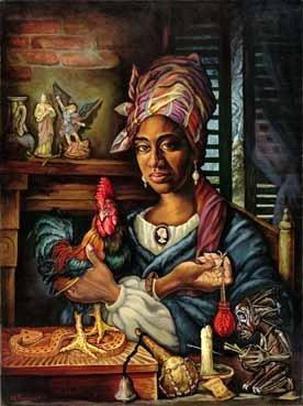"'You do!' 'Do what?' 'Remind me of the Babe!'"
Ok, Labyrinth movie jokes aside, today I decided to read a little about Hoodoo and to discover what are the differences between it and Voodoo, if there are any.
Hoodoo has some spiritual principles and practices similar to spiritual folkways in Haitian, Cuban, Jamaican and New Orleans traditions, and it seems to have evolved in the Mississippi Delta where the concentration of slaves was dense. Then, the belief spread throughout the Southeast as well as North along the Mississippi as African Americans left the Delta beginning in the 1930s.
There is still strong mainstream American prejudice against hoodoo, based on the myths that hoodoo is practiced primarily with selfish, hurtful intentions, or that it is related to worship of the Christian devil, Satan. Hoodoo is sometimes thought of as "folk magic" or "superstition". These terms tend to perpetuate the misperception that hoodoo is a childlike belief in tricks. The efficacy of hoodoo as a spiritual influence on outcomes in the physical and social world is comparable to that of mainstream religious rituals.
Spiritual folkways like hoodoo are an ever-evolving process, continuously synthesizing from contact with other cultures, religions and folkways. What is striking about the hoodoo folk process is the use of biblical figures in its practices and in the lives of its practitioners. In fact, most practitioners of hoodoo integrate this folkway with their Christian religious faith. Icons of Christian saints are often found on hoodoo shrines or altars.
Like voodoo, hoodoo shows evident links to the practices and beliefs of West African spiritual folkways. The ancient African folkway of Vodoun is a more standardized and widely dispersed spiritual practice than hoodoo. Vodoun's modern form is practiced across West Africa in the countries now known as Benin, Togo, and Burkina Faso, among others. In Haiti, Cuba, and other Caribbean islands, the worship of the Vodoun gods (called lwa or loas) is practiced in a syncretic form that has been greatly modified by contact with Catholicism. The Voodoo of Haiti and Louisiana Voodoo are related more to Vodoun than to hoodoo; similar Vodoun practices among Spanish speakers in Cuba are called Santería. However, a more precise description of what Voodoo is and how it relates to both Vodun and to Hoodoo is needed.
Ok, Labyrinth movie jokes aside, today I decided to read a little about Hoodoo and to discover what are the differences between it and Voodoo, if there are any.
Hoodoo has some spiritual principles and practices similar to spiritual folkways in Haitian, Cuban, Jamaican and New Orleans traditions, and it seems to have evolved in the Mississippi Delta where the concentration of slaves was dense. Then, the belief spread throughout the Southeast as well as North along the Mississippi as African Americans left the Delta beginning in the 1930s.
There is still strong mainstream American prejudice against hoodoo, based on the myths that hoodoo is practiced primarily with selfish, hurtful intentions, or that it is related to worship of the Christian devil, Satan. Hoodoo is sometimes thought of as "folk magic" or "superstition". These terms tend to perpetuate the misperception that hoodoo is a childlike belief in tricks. The efficacy of hoodoo as a spiritual influence on outcomes in the physical and social world is comparable to that of mainstream religious rituals.
Spiritual folkways like hoodoo are an ever-evolving process, continuously synthesizing from contact with other cultures, religions and folkways. What is striking about the hoodoo folk process is the use of biblical figures in its practices and in the lives of its practitioners. In fact, most practitioners of hoodoo integrate this folkway with their Christian religious faith. Icons of Christian saints are often found on hoodoo shrines or altars.
Like voodoo, hoodoo shows evident links to the practices and beliefs of West African spiritual folkways. The ancient African folkway of Vodoun is a more standardized and widely dispersed spiritual practice than hoodoo. Vodoun's modern form is practiced across West Africa in the countries now known as Benin, Togo, and Burkina Faso, among others. In Haiti, Cuba, and other Caribbean islands, the worship of the Vodoun gods (called lwa or loas) is practiced in a syncretic form that has been greatly modified by contact with Catholicism. The Voodoo of Haiti and Louisiana Voodoo are related more to Vodoun than to hoodoo; similar Vodoun practices among Spanish speakers in Cuba are called Santería. However, a more precise description of what Voodoo is and how it relates to both Vodun and to Hoodoo is needed.
~Ally

 RSS Feed
RSS Feed